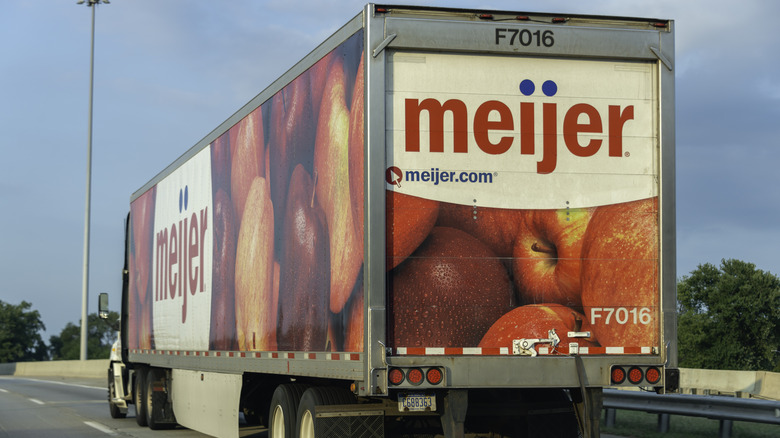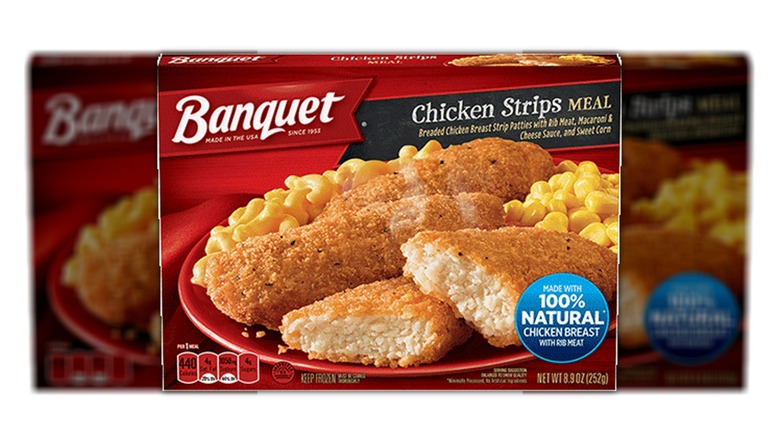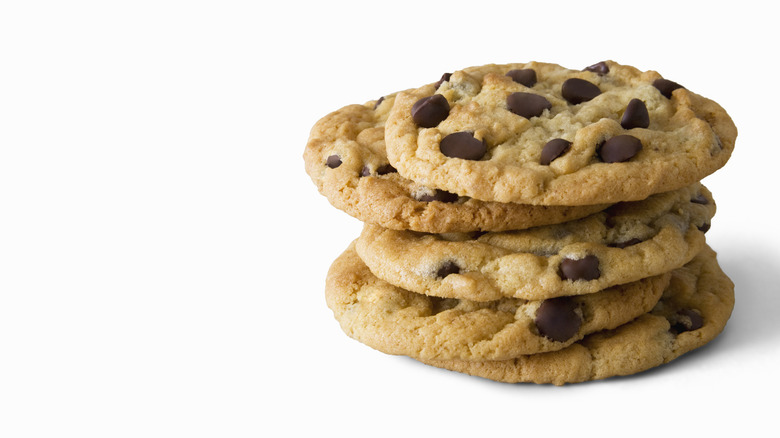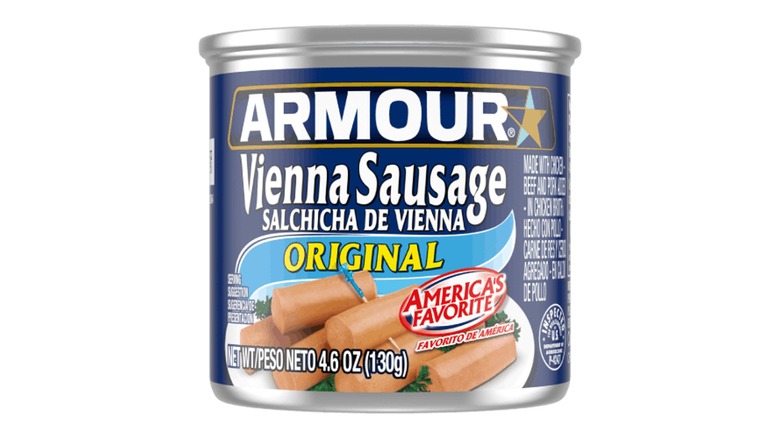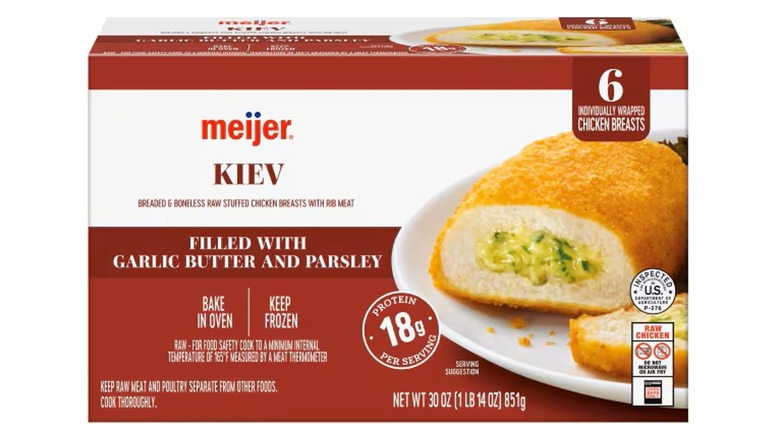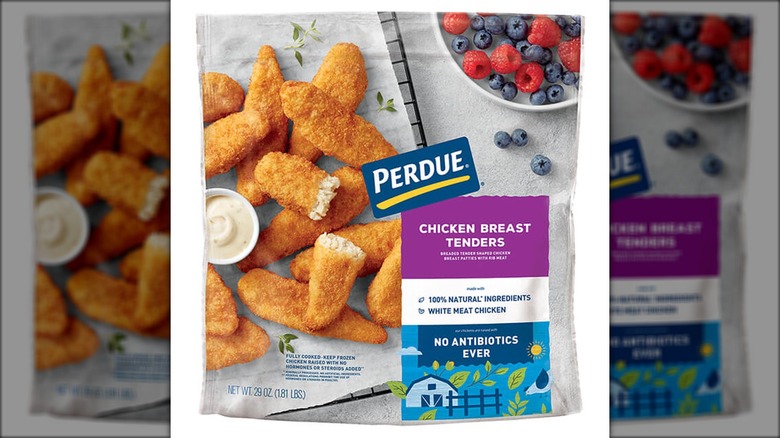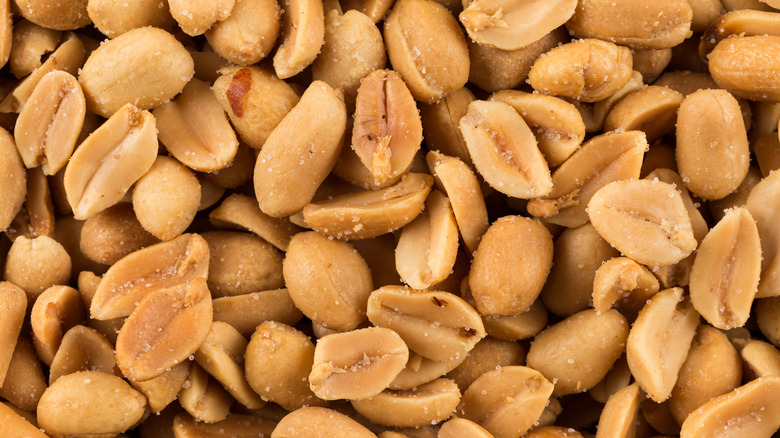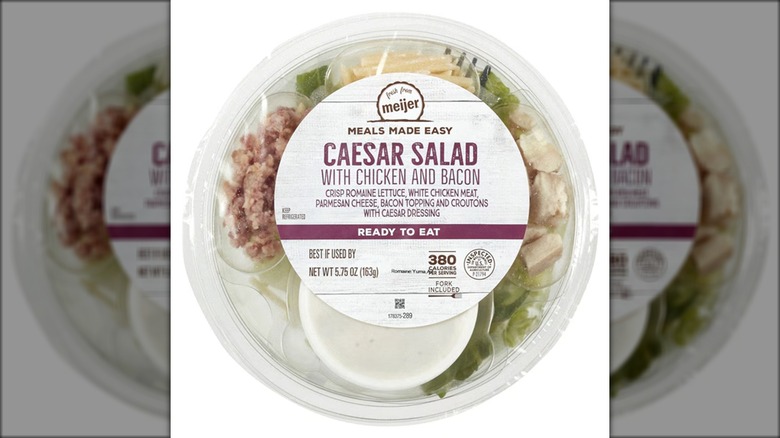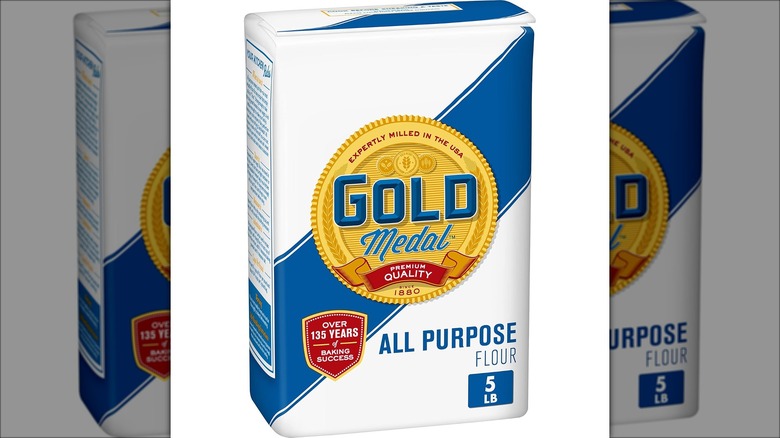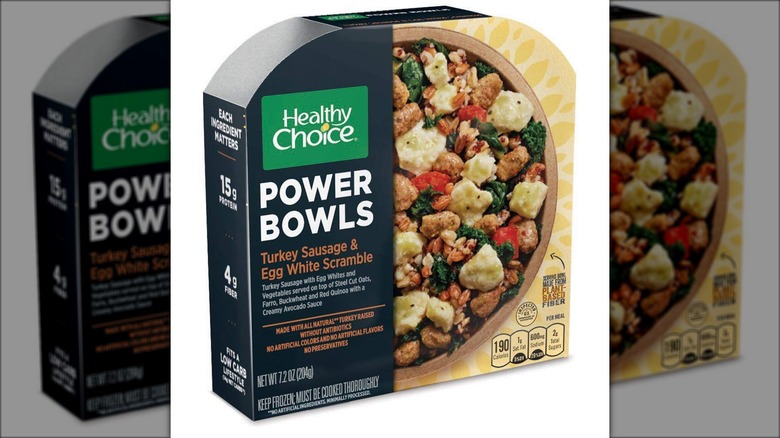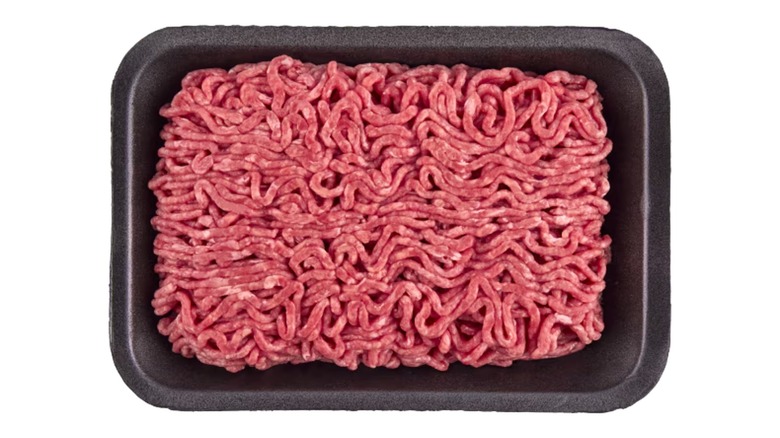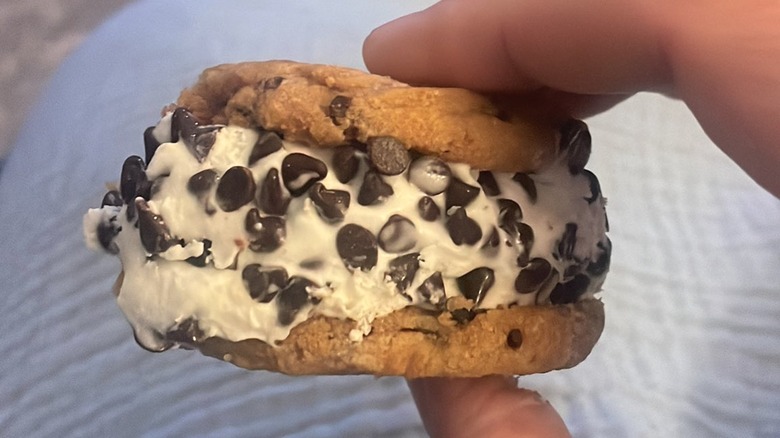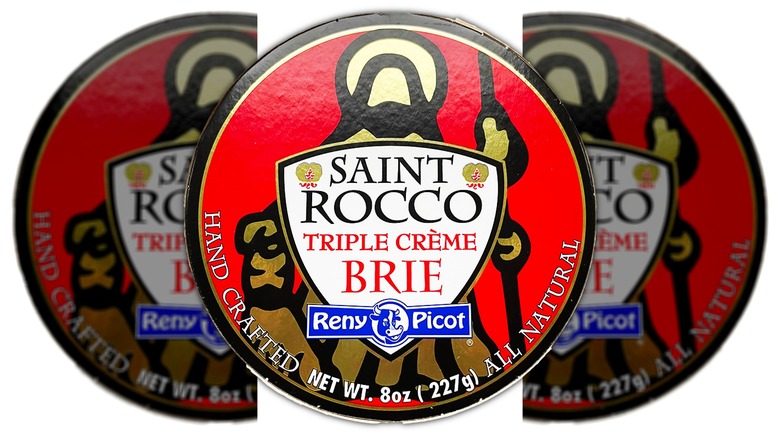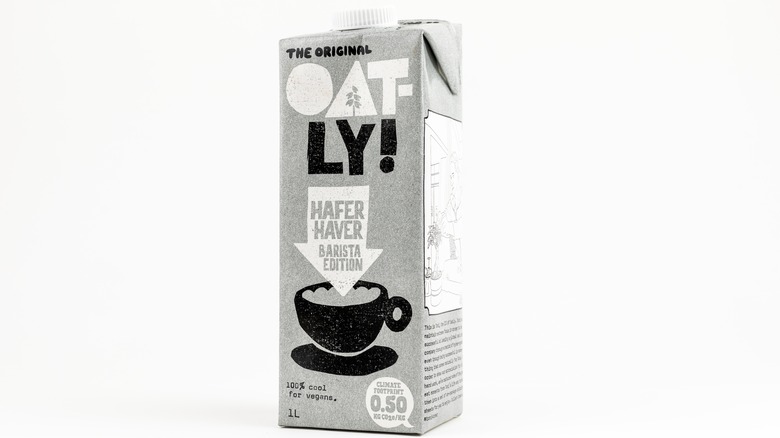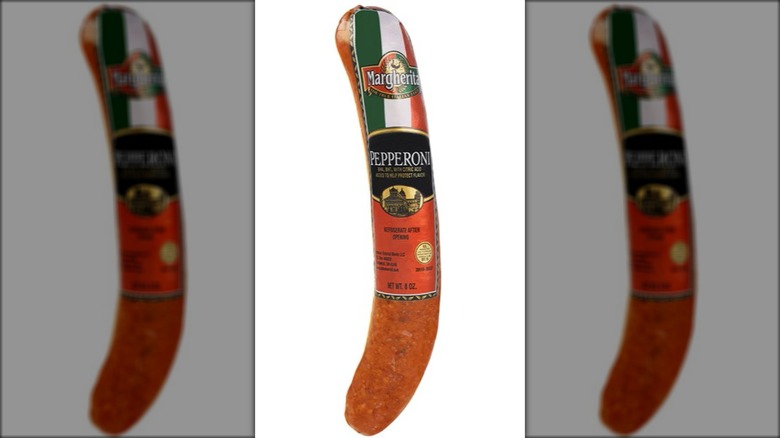14 Recalls That Will Always Haunt Meijer
We may receive a commission on purchases made from links.
Meijer is a grocery store brand located in the Midwest. At the time of writing, this company, which was founded in 1934, boasts over 500 stores and employs some 70,000 people. This success has been hard-earned; Meijer was the first company to introduce the superstore to the United States and has since built a reputation for supporting local communities and selling fresh, quality products.
This is not to say that the past 90 years have been plain sailing for Meijer. In particular, one relatively recent challenge faced by the grocery store brand is the huge number of recalls it has been issuing. During the first eight months of 2024 alone, Meijer issued recalls for 19 different products. While many of these recalls have been executed successfully, Meijer has also been embroiled in several haunting food recalls that saw products endanger Americans across the country. While the blame for faulty products often lies with food product manufacturers, grocery store brands like Meijer are the ones who have to pick up the pieces. Here are 14 times they desperately tried to do so.
1. Chicken strips recalled due to foreign objects
In September 2023, the Food Safety and Inspection Service announced that ConAgra Brands Inc. was recalling more than 245,000 pounds of frozen chicken strips from a huge variety of stores including more than 260 that were owned by Meijer. While it's unclear exactly what caused the chicken strips to become contaminated with foreign objects, the fact that they contained plastic would suggest that some kind of manufacturing fault occurred.
The chicken was recalled when a customer injured themselves on a piece of plastic while biting into a chicken strip. After suffering this minor oral injury, the customer duly complained and the recall was initiated. Despite a huge number of grocery store brands being involved in this recall, including Food Lion, Walmart, and Publix, a company that has more than a few haunting food recalls of its own, there were no further reports of injuries being caused by the contaminated chicken strips.
Meijer only stocked one product that was involved in this particular recall, the Banquet Classics Chicken Strips Meal. The grocery store encouraged those who'd already bought the product to return to their nearest Meijer store for a full refund.
2. Chocolate chip cookies recalled over undeclared allergen
Meijer's private-label cookies were embroiled in a recall when supplier Too Good Gourmet discovered that the cookies' packaging did not declare the presence of milk. As a common allergen, the failure to indicate its presence in the cookies posed a significant health risk; if those allergic to milk erroneously consume the allergen they can suffer from symptoms including vomiting, hives, and even anaphylaxis.
The recall was issued by the Food and Drug Administration in the second week of August 2024, for chocolate chip Meijer Dunking Cookies. Stores in all six states in which the company operates were affected: Michigan, Indiana, Illinois, Ohio, Kentucky, and Wisconsin. These recalls were performed quickly and efficiently, and were one of the main reasons why there were no reports of customer illnesses occurring as a result of the mislabelled goods. Nonetheless, such a basic oversight undoubtedly paints both Meijer and its supplier in an extremely bad light.
3. Canned sausages recalled due to packaging defect
Just a few months before it recalled its chicken strips for containing foreign objects, ConAgra Brands Inc. recalled over 2.5 million pounds of canned meat and poultry products. According to the Food Safety and Inspection Service, this recall was initiated on the last day of January 2023 after it was discovered that the cans had been damaged during the production process. This left them vulnerable to leaking and the food inside spoiling in ways that would not be readily apparent to customers.
Meijer stocked three products that were involved in this recall: Armour Chicken Vienna Sausage 4.6-ounce cans, Armour Vienna Sausage six pack, and Armour Vienna Sausage Original 4.6-ounce cans. The biggest concern surrounding these and the other recalled products was that they would become contaminated by pathogens that are not identifiable by sight or taste. As food safety expert James E. Rogers explained to Consumer Reports, "The biggest risk of cans that are bulging, leaking, or badly dented is that the food could be contaminated with Clostridium botulinum, which you can't see or taste. The toxin it produces can be deadly even in very small amounts." Thankfully, there were no reported cases of botulism or any other illnesses associated with the recalled products.
4. Chicken recalled due to salmonella outbreak
During July 2015, the Centers for Disease Control and Prevention announced that stuffed, frozen chicken products produced by Barber Foods were being recalled after they'd been linked with a salmonella outbreak. Over 1.7 million pounds of the products were recalled. Several retail brands were forced to pull products from their shelves, including Meijer; cartons of both chicken cordon bleu and chicken Kiev were pulled from their stores.
While Meijer and several other grocery store brands executed their recalls successfully, it was not enough to prevent 15 people from falling ill with salmonellosis, which causes symptoms such as diarrhea, stomach cramps, and fever. The cases of this illness were spread across seven states, and four people were hospitalized. It is not known for sure whether any of the people who fell ill bought the chicken products from Meijer. Nonetheless, being involved in such an outbreak is not something that the grocery store chain or its customers will readily forget.
5. Chicken products recalled due to metal contaminants
Meijer seems to have especially bad luck when it comes to chicken as a further recall was issued for this popular protein in mid-August 2024. This time it was Perdue Foods LLC that triggered a recall of some 167,000 pounds worth of chicken nuggets and chicken tenders after customers complained of finding a piece of metal wire embedded in their food. Per the Food Safety and Inspection Service none of these individuals reported suffering from an injury.
Two of the recalled products were stocked at Meijer stores: Frozen Perdue Breaded Chicken Tenders and Frozen Perdue Simply Smart Organics Gluten Free Breaded Chicken Nuggets. According to a company statement, the wire ended up in the chicken due to a fault in the manufacturing process. Given that this is just the most recent of several instances where products have been recalled due to being contaminated with foreign objects, Meijer customers have a right to wonder whether the manufacturing standards enforced by the grocery store chain's suppliers are stringent enough. Anyone still concerned might even consider making their own chicken nuggets or chicken tenders at home, where they can be certain of the ingredients they're using.
6. Peanut products recalled due to huge salmonella outbreak
Meijer was caught up in one of the United States' largest-ever food recalls when peanuts contaminated with salmonella were used to make more than 3,900 products. Occurring over both 2008 and part of 2009, the subsequent outbreak was enormous, sickening over 500 people, hospitalizing 116, and likely contributing to nine people dying.
It's thought that over 200 companies were forced to pull items from their shelves. Meijer itself pulled several peanut-containing items including both its private-label Cheese and Peanut Butter Crackers and its Peanut Butter and Jelly Ice Cream. As the numbers attest, these recalls came all too late to protect many Americans.
Adding further notoriety to this recall was the news that Stewart Parnell, who was the Peanut Corporation of America's president at the time, acted in an unlawful manner during the outbreak. In an interview with NPR, Bill Marler, a food safety lawyer who represented some of the people who fell ill during the outbreak, said, "Stewart Parnell absolutely knew that they were shipping salmonella-tainted peanut butter. They knew it, and they covered it up." In a landmark case, Parnell got a 28-year prison sentence, ensuring no one forgets this horrific recall any time soon.
7. Various salads recalled due to E. coli outbreak
Certain strains of E. coli bacteria pose a serious risk to human health if accidentally ingested. Aside from causing bloody diarrhea, stomach pain, and fever, ingesting E. coli bacteria can also lead to a type of kidney failure called hemolytic uremic syndrome. This illness is extremely serious and often causes lifelong health problems in those who contract it. This is why Meijer and many other grocery store brands acted quickly when it was discovered that numerous salads had to be recalled due to them being contaminated with E. coli bacteria.
An investigation conducted by the Centers for Disease Control and Prevention into the 2019 outbreak traced it to romaine lettuce that'd been grown in California's Salinas Valley. As this lettuce was used as a base ingredient in many bagged salads, various retailers had to pull multiple items from their shelves. For example, Meijer recalled nine bagged salad products including both its Chicken Caesar Salad Single and its Mango Habanero Steak Salad.
Despite retailers like Meijer acting quickly, the contaminated lettuce had a massive impact on the American public with 167 individuals falling ill. Of these, 85 people were hospitalized and 15 contracted hemolytic uremic syndrome. Fortunately, there were no fatalities associated with this outbreak.
8. Flour recalled due to E. coli outbreak
Products sold by Meijer were involved in another E. coli outbreak, this one occurring in 2015 and 2016. The Centers for Disease Control and Prevention discovered that flour, made in a General Mills factory in Kansas City, was the source of the outbreak. This flour was used in numerous products and Meijer alone had to remove seven different flour products from its stores. This recall was first issued In May 2016, eight months after the first illness was reported.
E. coli bacteria are killed if food is cooked sufficiently. This means the flour was safe to eat if it was used to make a properly baked good. However, by the time the investigation closed a total of 63 people had been reported as becoming ill thanks to them adopting inadvisable and dangerous practices such as tasting raw dough. Of these 63, 17 people were hospitalized and one developed hemolytic uremic syndrome. The real numbers are expected to be higher as the contaminated products had extremely long shelf lives and thus were at risk of still being used and consumed long after the investigation ended.
9. Power bowls recalled because they contained rocks
In April 2020, ConAgra Brands Inc. issued a recall in conjunction with the Food Safety and Inspection Service for over 130,000 pounds worth of chicken bowl products amid reports that they contained small rocks. Just one month later, the recall was expanded to include over 276,000 pounds worth of both chicken and turkey bowl products.
As part of this expanded recall, Meijer pulled four products from its shelves: Healthy Choice Power Bowl Turkey Sausage Egg, Healthy Choice Power Bowl Unwrapped Burrito, Healthy Choice Power Bowl Pesto Egg Scramble, and Healthy Choice Chicken Feta Farro Power Bowl. The recall was given class one status by FSIS, the highest classification possible.
The recall was initiated after customers complained of finding the small rocks in and amongst their food. Interestingly, the products were traced back to two different factories, raising the question as to how rocks were erroneously introduced to the production process at both facilities. While no serious injuries were reported in conjunction with the recall, such a glaring oversight does not paint a pretty image of Meijer's suppliers.
10. Ground beef recalled because it contained plastic
Unfortunately for Meijer, it has a history of stocking food that's packed with inedible foreign objects as demonstrated by a recall issued in April 2019 by JBS Plainwell. Per the Food Safety and Inspection Service, this company recalled over 43,000 pounds worth of ground beef after two customers complained of finding pieces of hard, green plastic in the meat. Three of Meijer's private label products were involved in the recall and were summarily removed from stores in both Michigan and Wisconsin, the only two states that received the faulty goods.
While the previously mentioned power bowl recall was given class one status by the FSIS, this recall was only given class two status, suggesting that it did not pose as much danger to the public. This classification was justified; no illnesses or injuries were associated with the recalled products, marking this recall as a successful one.
11. Ice cream sandwiches recalled over listeria concerns
Listeria monocytogenes is a type of bacteria that, if ingested, can cause an illness called listeriosis. While leading to unsavory symptoms in all types of people, listeriosis is particularly dangerous for pregnant people as it often leads to miscarriage, stillbirth, and premature delivery. If the disease spreads beyond the intestine, it is deemed invasive listeriosis. This is a very serious illness that kills about one in six of the people who contract it, hence why Meijer moved so quickly in June 2024 to dispose of products that were potentially contaminated with l.isteria
The recall was issued after listeria was detected on a production line that was used to process a variety of products. The products in question were ice cream-based and made by Totally Cool Inc. While they were distributed nationwide, Meijer only recalled one product from its store — a three pack of Chipwich Vanilla Chocolate Chip Ice Cream Sandwich. Thankfully, the swift nature of the recall ensured that no instances of listeriosis were reported.
12. Brie recalled due to listeria outbreak
In September 2022, the Food and Drug Administration announced that Old Europe Cheese Inc. was recalling both its Brie and Camembert cheeses after they'd been linked with an outbreak of listeria monocytogenes. These products were distributed across the United States and Mexico by retailers including Meijer, Lidl, and Whole Foods, a company that boasts an impressive cheese department. In Meijer's case, three products were removed from stores: Reny Picot Double Crème Brie Wheel, Reny Picot Triple Crème Brie, and Naturally Good Kosher Double Crème Brie.
The cheeses produced by Old Europe Cheese Inc. were linked with an outbreak that sickened six individuals, five of whom required hospitalization. As a result of the outbreak, the FDA sent a warning letter to the company, clearly noting how its sanitation practices were not up to scratch. It's safe to say that this damning report will have done little to boost customers' trust in Old Europe Cheese Inc., nor the retailers which stock its products.
13. Oat milk recalled over microbial contamination concerns
During August 2022, Lyons Magnus LLC recalled a variety of alternative milk products and beverages over concerns that they'd been contaminated with bacteria, namely cronobacter sakazakii and clostridium botulinum. According to the Food and Drug Administration, these concerns were raised after it was discovered that the products had not been properly sterilized. As part of this recall, Oatly Oat Milk Barista Edition was recalled from Meijer stores.
Both cronobacter sakazakii and clostridium botulinum pose a significant risk to humans. Ingesting the former can lead to very serious illnesses developing, including both sepsis and meningitis, while ingesting the latter leads to botulism which can cause patients to suffer from muscle paralysis. Thankfully, no one reported any illnesses in association with these faulty products, however a failure to properly sterilize products is a serious mistake that will have knocked many consumers' confidence in these grocery store brands and their suppliers.
14. Pepperoni recalled due to bacillus cereus contamination
December 2021 saw Smithfield Packaged Meats Corp. issue a recall for just under 11,000 pounds of pepperoni products amid concerns that they'd been contaminated with bacillus cereus, a type of bacteria that causes a mild form of food poisoning. Those who fall ill often experience nausea and vomiting roughly 30 minutes to five hours after eating the contaminated food. Symptoms usually clear up within 24 hours.
This was an especially concerning recall as the product was ready to eat, meaning there was little chance that the product would be made safe to eat via cooking. In response to the recall, Meijer pulled its eight-ounce Margherita Pepperoni Stick from its stores. Other affected grocery store brands included Safeway, ShopRite, and Wegmans. However, despite this mass recall only 241 pounds of the contaminated product was recovered. Nonetheless, the Food Safety and Inspection Service did not hear of any illnesses arising due to the contaminated product.
